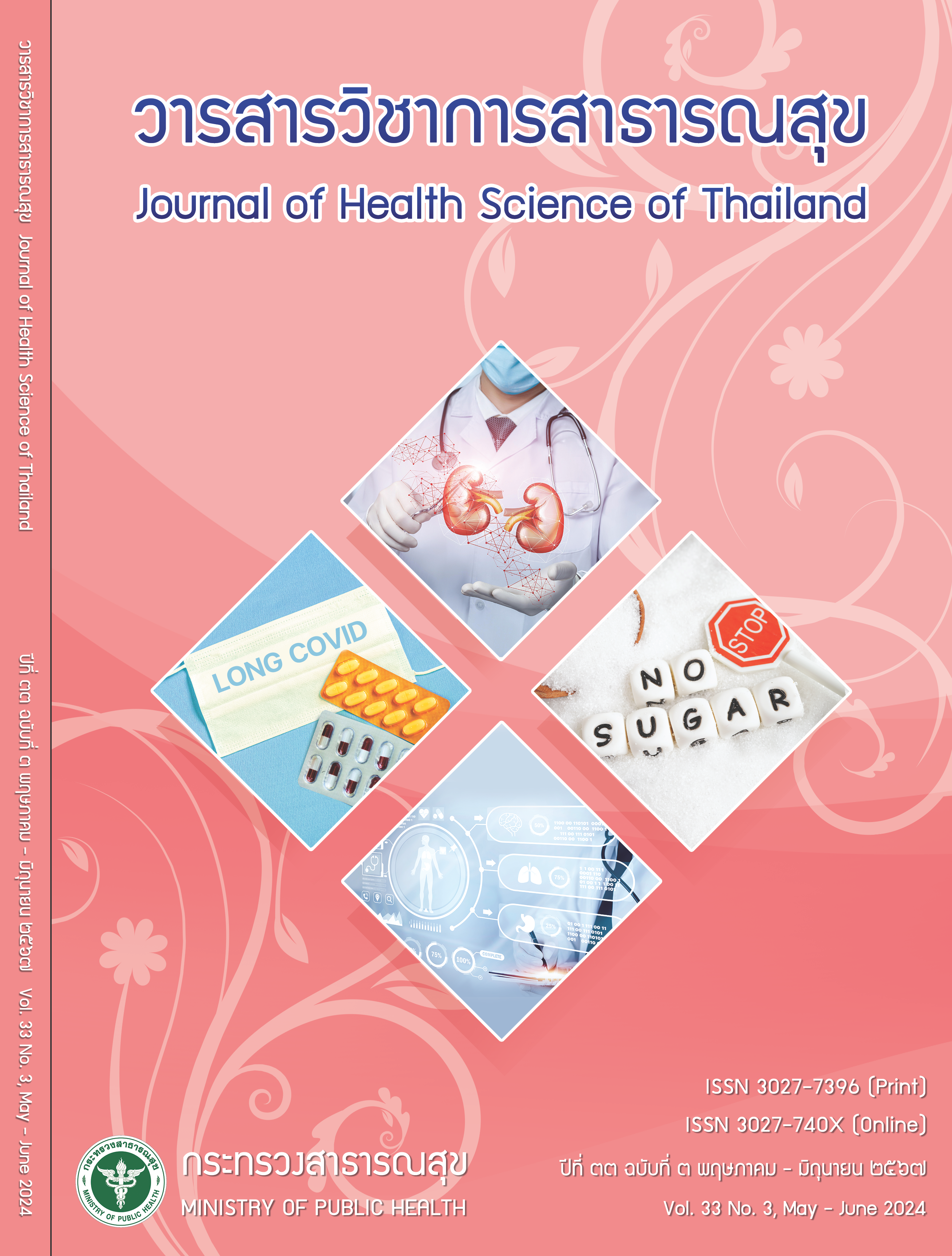Effect of Self-Management Program with Group Process Learning on Health Behavior and Blood Pressure Level among New Hypertension Patient in Thung Yai Hospital, Nakhon Si Thammarat Province
Keywords:
newly diagnosed hypertension, self-management program, group process-based learningAbstract
New cases of hypertension increase every year, with a continuous upward trend. The main causes is related to unhealthy behaviors: consuming sweet foods, oily, and salty tastes, irregular exercise, and continuous medication non-adherence. The aim of this quasi-experimental research was to investigate the effects of a self-management program combined with group process-based learning on health behavior and blood pressure levels in newly diagnosed hypertension patients. The study was conducted at Thung Yai hospital, Nakhon Si Thammarat province, with a total of 82 participants who were divided into experimental and control groups, each consisting of 41 individuals. The intervention was carried out for 6 weeks, during which the experimental group received the self-management program combined with group process-based learning, while the control group received regular hospital services. Data were analyzed using inferential and descriptive statistics. The results revealed statistically significant differences (p<0.05) in all three aspects of health behaviors (diet, exercise, and medication adherence) and systolic blood pressure levels between the experimental and control groups. However, there was no statistically significant difference (p>0.05) in diastolic blood pressure levels between the two groups. Therefore, public health personnel should implement self-management programs combined with group process-based learning to promote proper self-management skills regarding health behaviors among newly diagnosed hypertension persons. This intervention could lead to better blood pressure control and prevention of subsequent complications.
Downloads
References
กรมควบคุมโรค กองโรคไม่ติดต่อ. รายงานสถานการณ์โรค NCDs เบาหวาน ความดันโลหิตสูง และปัจจัยเสี่ยงที่ เกี่ยวข้อง พ.ศ. 2562 [อินเทอร์เน็ต]. 2563 [สืบค้นเมื่อ 29 ก.ค. 2565]. แหล่งข้อมูล: https://ddc.moph.go.th/uploads/publish/1035820201005073556.pdf
กรมควบคุมโรค กองโรคไม่ติดต่อ. รายงานประจำปี 2565 กองโรคไม่ติดต่อ [อินเทอร์เน็ต]. 2565 [สืบค้นเมื่อ 16 ม.ค. 2567]. แหล่งข้อมูล: http://www.thaincd.com/2016/ mediadetail.php?id=14502&gid=1-015-005
คลังข้อมูลสุขภาพ กระทรวงสาธารณสุข. อัตราป่วยรายใหม่ ของโรคความดันโลหิตสูงต่อแสนประชากรในปีงบประมาณ [อินเทอร์เน็ต]. 2565 [สืบค้นเมื่อ 29 ก.ค. 2565]. แหล่ง ข้อมูล: https://nrt.hdc.moph.go.th/hdc/reports/report.php?
Kanfer FH, Gaelick-Buys L. Self-management methods. In: Kanfer FH, Goldstein AP, editors. Helping people change: a textbook of methods 1991. Oxford: Pergamon Press; 1991. p. 305–60.
นพาภรณ์ จันทร์ศรี, กนกพร นทีธนสมบัติ, ทวีศักดิ์ กสิผล. ผลของโปรแกรมการจัดการตนเองในผู้ป่วยโรคความดันโลหิตสูงที่ควบคุมความดันโลหิตไม่ได้. วารสารวิทยาศาสตร์และเทคโนโลยีหัวเฉียวเฉลิมพระเกียรติ 2563;6(2):58- 68.
วิยะการ แสงหัวช้าง. ผลของการให้ความรู้โดยใช้กระบวนการ กลุ่มและการติดตามทางโทรศัพท์ต่อความรู้และพฤติกรรม การป้องกันโรคหลอดเลือดสมองในผู้สูงอายุเจ็บป่วยเรื้อรัง. วารสารศูนย์การศึกษาแพทยศาสตร์คลินิก โรงพยาบาลพระปกเกล้า 2556;30(4):260-73.
ยุพดี ทีปะลา, ยุวยงค์ จันทรวิจิตร, รัตนชฎาวรรณ อยู่นาค. ผลของโปรแกรมการออกกำลังกายด้วยการเต้นบาสโลบ ต่อระดับความดันโลหิตและดัชนีมวลกายในกลุ่มผู้ป่วยโรค ความดันโลหิตสูง. พยาบาลสาร 2563;47(3):109-21.
Cohen J. Statistical power analysis for the behavioral sciences. New York: Academic Press; 2013.
Cronbach LJ. Coefficient alpha and the internal structure of tests. Psychometrika 1951;16:297-334.
นริศรา คงแก้ว, อนุธิดา ชัยขันธ์, ดุษณีย์ สุวรรณคง, ตั้ม บุญรอด. ผลของโปรแกรมปรับเปลี่ยนพฤติกรรมการบริโภค อาหารตามแนวทางของ DASH ในกลุ่มเสี่ยงต่อโรคความดันโลหิตสูง อำเภอนาบอน จังหวัดนครศรีธรรมราช. วารสารวิชาการสาธารณสุข 2565;31(6):1008-18.
Ashoorkhani M, Bozorgi A, Majdzadeh R, Hosseini H, Yoonessi A, Ramezankhani A, et al. Comparing the effectiveness of the BPMAP (Blood Pressure Management Application) and usual care in self-management of primary hypertension and adherence to treatment in patients aged 30-60 years: study protocol for a randomized controlled trial. Trials 2016;17(1):511.
Putri SE, Rekawati E, Wati DNK. Effectiveness of self-management on adherence to self-care and on health status among elderly people with hypertension [Internet]. 2021 [cited 2023 May 19]. Available from: https:// pubmed.ncbi.nlm.nih.gov/34060750/
ศิรินทรา ด้วงใส, ทิพมาส ชิณวงศ์. ผลของโปรแกรมสนับสนุน การจัดการตนเองตามแบบ 5 เอ ต่อพฤติกรรมการจัดการ ตนเองในผู้ป่วยความดันโลหิตสูงที่ควบคุมไม่ได้. วารสารพยาบาลสงขลานครินทร์ 2564;41(4):74-85.
สมาคมความดันโลหิตสูงแห่งประเทศไทย. แนวทางการรักษา โรคความดันโลหิตสูง ในเวชปฏิบัติทั่วไป พ.ศ. 2562 [อินเทอร์เน็ต]. 2562 [สืบค้นเมื่อ 19 ส.ค. 2565]. แหล่ง ข้อมูล: http://www.thaihypertension.org/files/HT%20 guideline%202019.with%20watermark.pdf
วรางคณา ไชยวรรณ, รังสิยา นารินทร์, วิลาวัณย์ เตือนราษฎร. ผลของโปรแกรมการจัดการตนเองต่อความร่วมมือในการ รักษาด้วยยาและระดับความดันโลหิตในผู้ที่เป็นโรคความดัน โลหิตสูงในชุมชน. พยาบาลสาร 2565;49(3):218-32.
Sukpattanasrikul S, Monkong S, Leelacharas S, Krairit O, Viwatwongkasem C. Comparison of hypertensive outcomes after the implementation of self-management program for older adults with uncontrolled hypertension in Krabi, Thailand: a quasi-experimental study. J Health Res 2022;36(4):641-51.
Long KQ, Linh BP, Adler AJ, Shellaby JT, Aerts A, McGuire H, et al. Effect of community-based intervention on self-management of blood pressure among hypertensive adults: findings from the communities for healthy hearts quasi-experimental study in Vietnam [Internet]. 2020 [cited 2023 Mar 10]. Available from: https:// www.novartisfoundation.org/news/media-library
สุพัตรา สิทธิวัง, ศิวพร อึ้งวัฒนา, เดชา ทำดี. ผลของ โปรแกรมส่งเสริมการจัดการตนเองต่อพฤติกรรมสุขภาพ และระดับความดันโลหิตของผู้ที่เป็นโรคความดันโลหิตสูงที่ ควบคุมไม่ได้. พยาบาลสาร 2563;47(2):85-97.
ชรินรัตน์ ศิริทวี, วาริณี เอี่ยมสวัสดิกุล, มุกดา หนุ่ยศรี. ผล ของโปรแกรมพัฒนาพฤติกรรมสุขภาพผู้ป่วยโรคความดัน โลหิตสูง โรงพยาบาลรัตนบุรี จังหวัดสุรินทร์. วารสารวิจัย และพัฒนาระบบสุขภาพ 2563;13(2):307-17.
ปรีดา ยศดา, วาริณี เอี่ยมสวัสดิกุล, มุกดา หนุ่ยศรี. ผลของ โปรแกรมพัฒนาพฤติกรรมป้องกันโรคหลอดเลือดสมองของ ผู้ป่วยโรคความดันโลหิตสูง อำเภอบรบือ จังหวัดมหาสารคาม. วารสารพยาบาล 2562;68(4):39-48.
Downloads
Published
How to Cite
Issue
Section
License
Copyright (c) 2024 Ministry of Public Health

This work is licensed under a Creative Commons Attribution-NonCommercial-NoDerivatives 4.0 International License.







